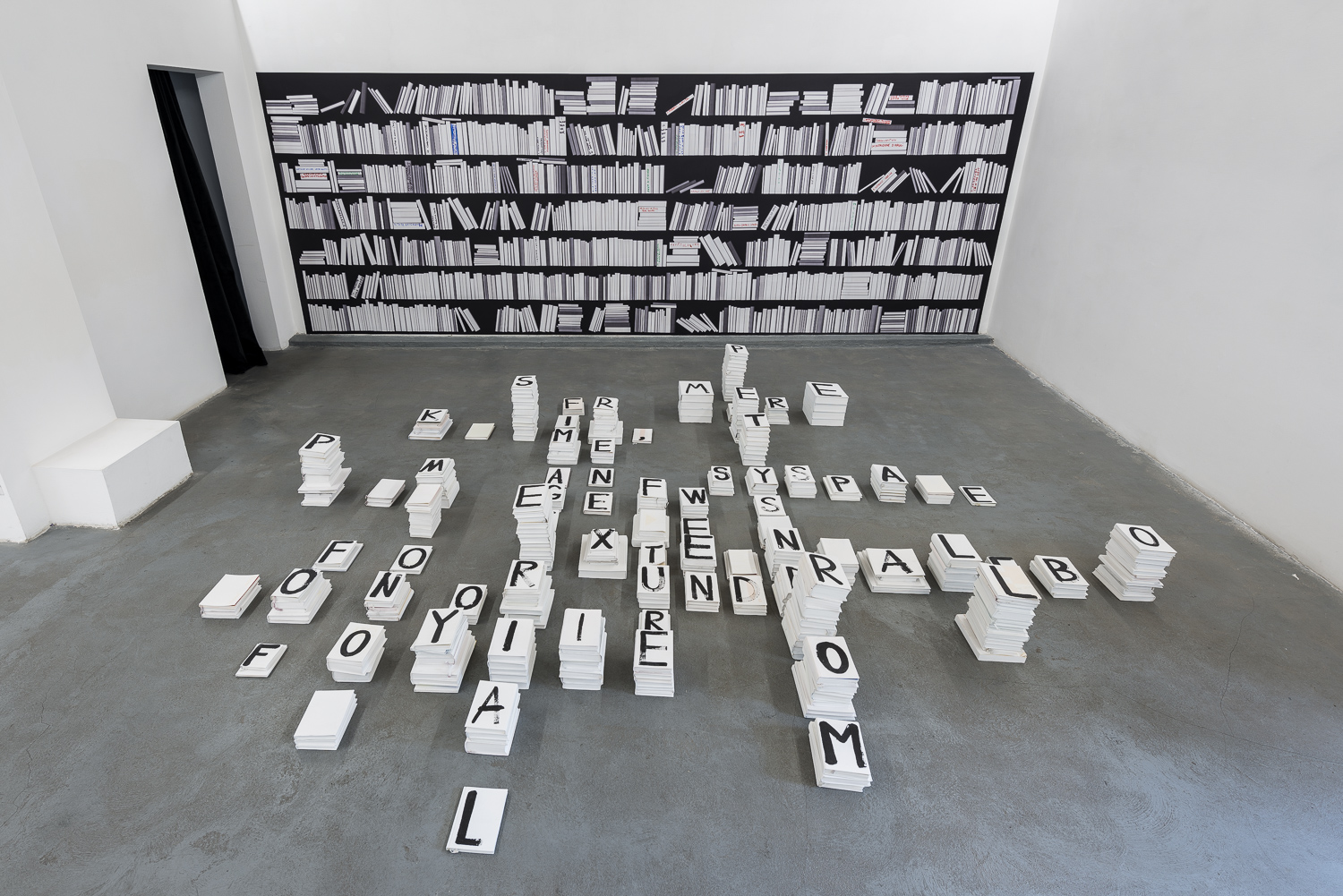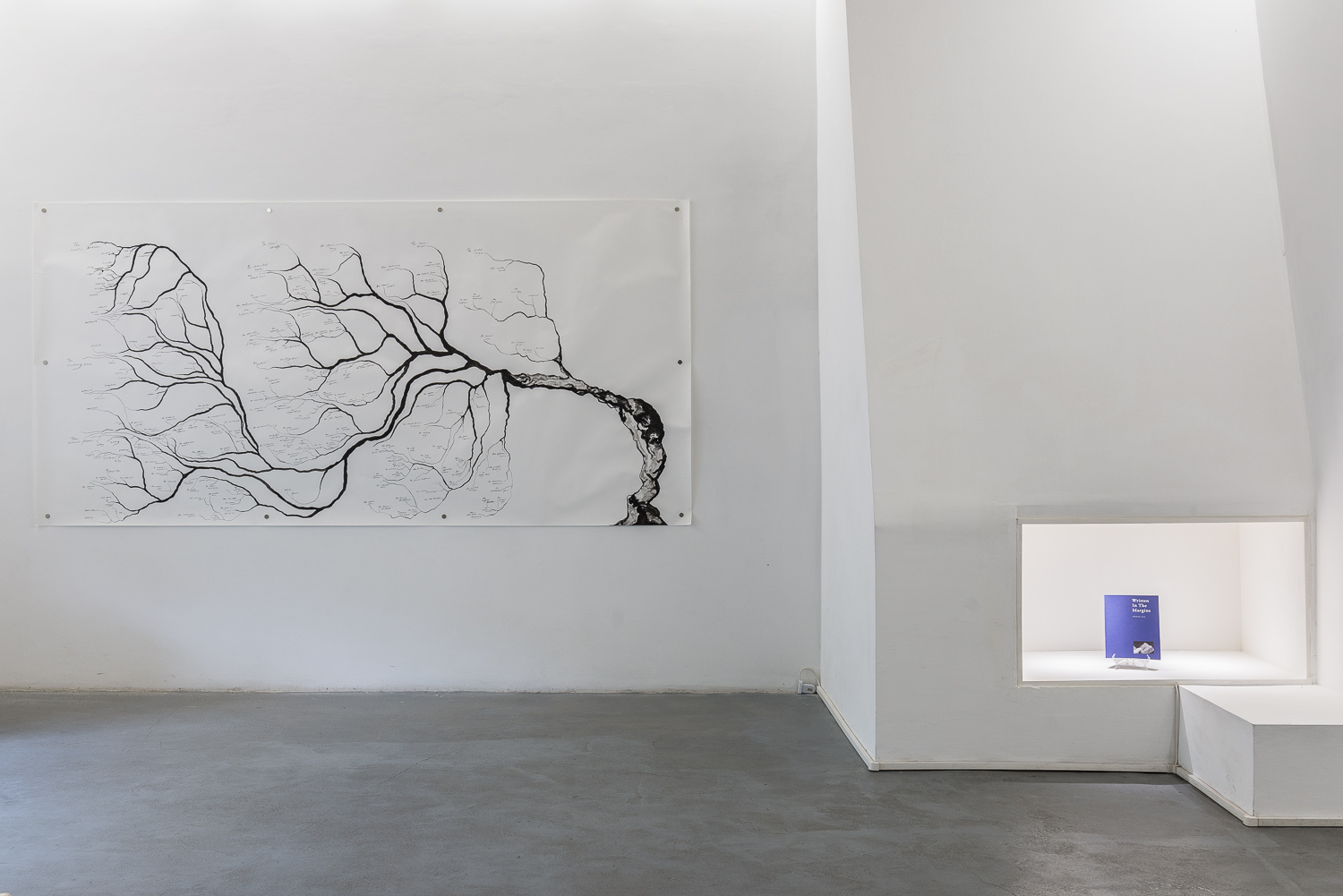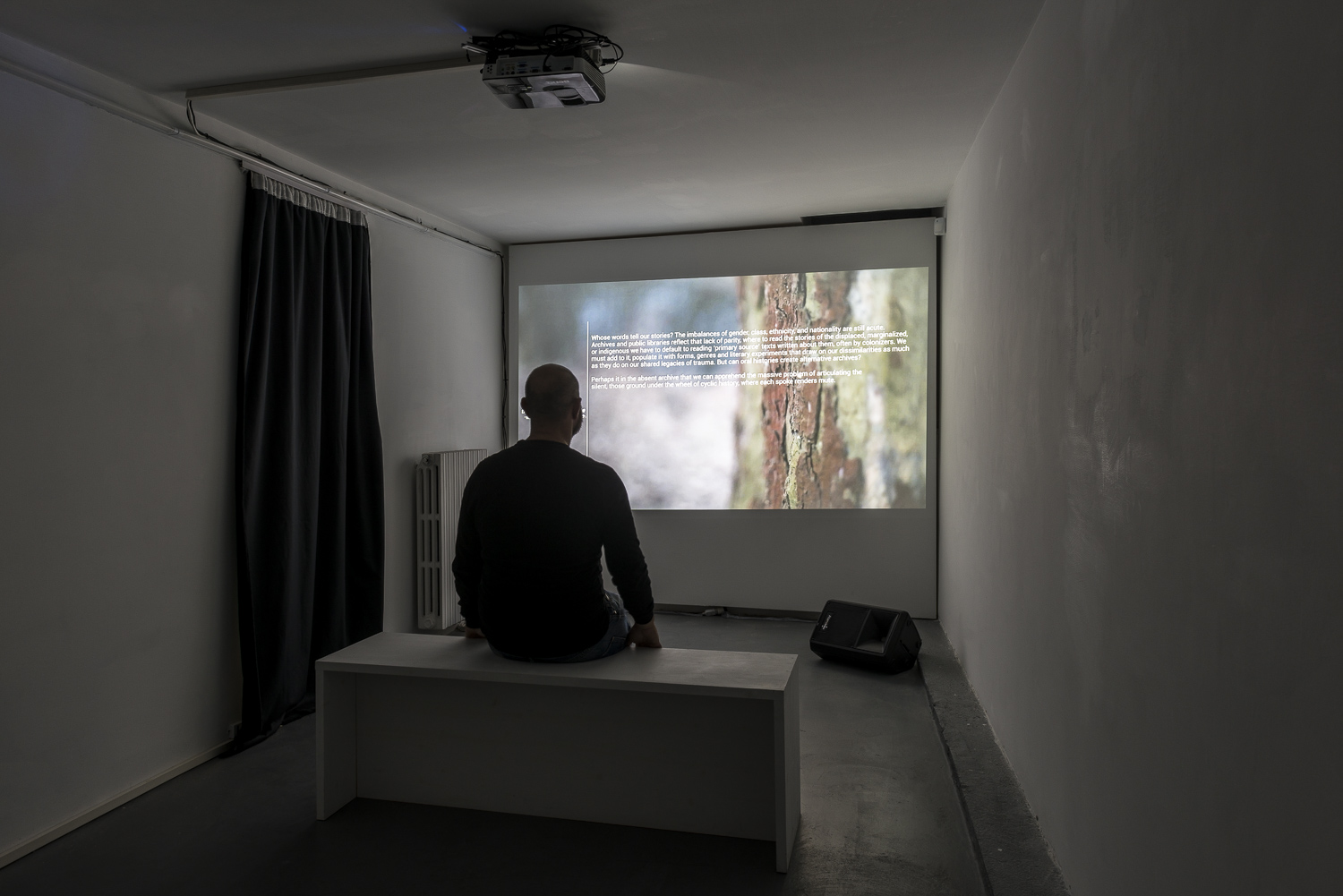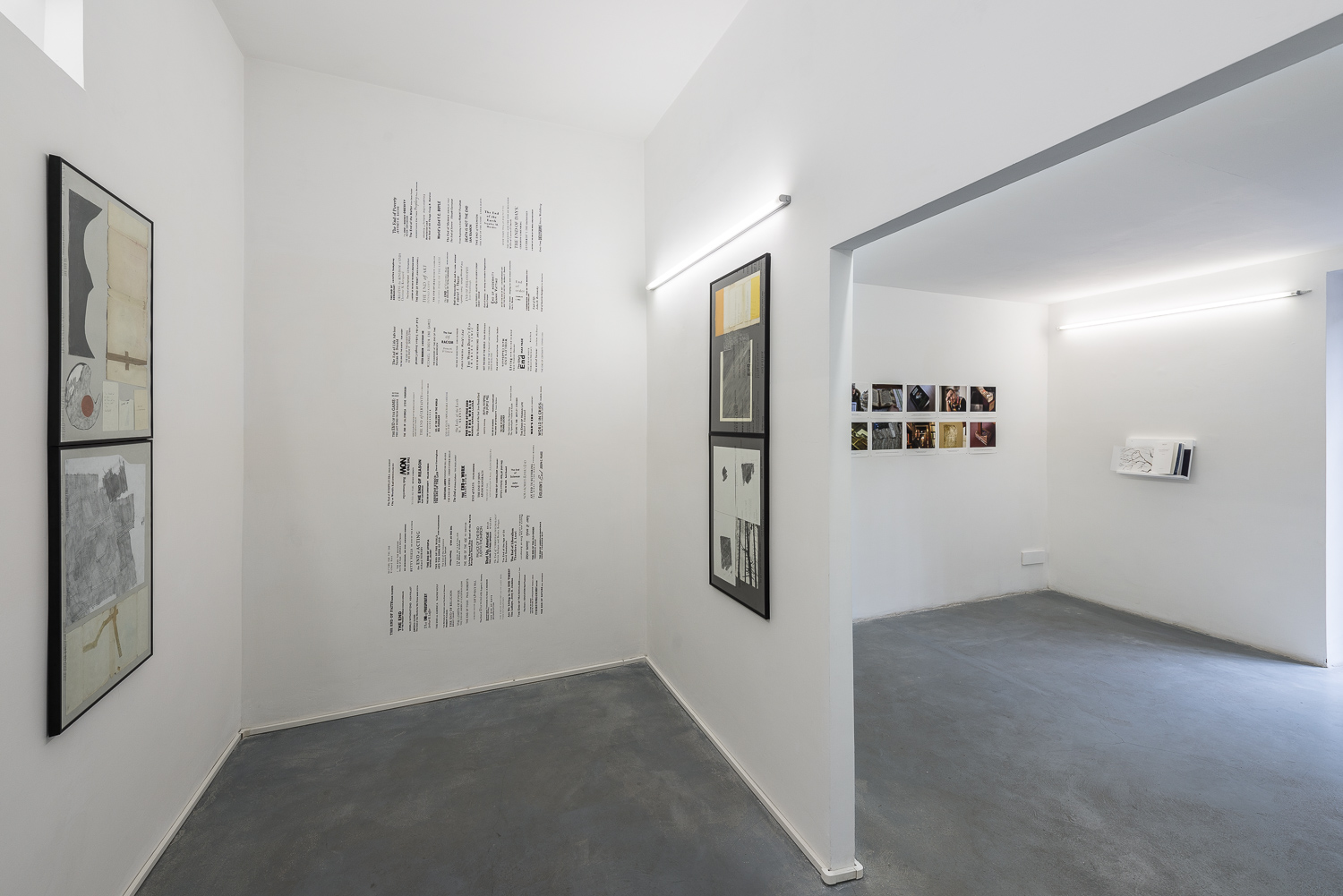About Books
Critical text for the show About Books | Shubigi Rao – Jaro Varga. AlbumArte, Rome, October – November 2018.

In the foreground: Jaro Varga, In Someone’s Else Dream, 2017; site specific installation, dimensions variable. In the background: Jaro Varga, Library 03.10 – 03.11.2018, 2011-2018; site specific installation, dimensions variable.
Ph. Sebastiano Luciano, courtesy AlbumArte.
Like museums, zoos or encyclopedias, libraries are a hierarchical construct based on authoritative taxonomies that are the product of the particular moment in history when they came into being.
Every library constructs a certain type of knowledge and knowing that is characteristic of the era’s discourse. Libraries are places of dreams, aspirations, and possibilities. They accumulate memory. In the work of Jaro Varga and Shubigi Rao, books and libraries are understood as a model of material knowledge that exercises power. Both artists, who come from different cultural, social, and political backgrounds but who nevertheless share a surprisingly similar artistic program, have a long history of working with the motif of libraries, which they see as a model for learning, a mnemonic device with a discursive potential in the sense of Aby Warburg’s Mnemosyne Atlas. At the exhibition, Slovak artist Jaro Varga presents his site-specific installations Library, Untitled II, and In Someone Else’s Dream. Singaporean artist Shubigi Rao presents her works from the project Pulp: A Short Biography of the Banished Book – a series of videos and one large-format drawing.
Singaporean artist Shubigi Rao’s range of interests includes ancient sciences, history, archeology, neuroscience, language, epistemology, libraries, and cultural genocide. She creates archeological archives and pseudo-museums, writes ironic guidebooks for nation-buildings, and in her installations makes use of text-based and visual games and anagrams. Her work consists of films, documents, installations, drawings, etching, books, photographs, and pseudo-scientific systems.

Left: Shubigi Rao, Being a Brief Guide to the Banished Book, 2017; ink on paper, cm 150 x 300.
Right: Shubigi Rao, Written in the Margins, 2017; publication, 88 pp., cm 20 x 25.
Ph. Sebastiano Luciano, courtesy AlbumArte.
.
At the show About Books, we present Written in the Margins, which is the first portion of material from Pulp: A Short Biography of the Banished Book. This work has been awarded the Juror’s Choice Award at the ABP Signature Art Prize 2018. Shubigi Rao has been working on this project since 2013. For this work, which explores the history of repression through books and libraries, Rao created a series of documentary films about public and private collections, libraries, and archives.
She collects various fragments, ephemera, and anecdotes, exploring the connect trajectories of literature and violence.
The videos in the project are documentary interviews with librarians or archivists about their institutions’ turbulent histories or unusual nature or about the origin of their collection (one interview is with a curator at the Henrik Conscience Library in Antwerp regarding the discovery of some writings by Victor Hugo in one of the library’s books; another is with an editor, translator and poet from Sarajevo about rebuilding a library destroyed during the war; another one is about rescuing books damaged by fire at the Leuven University Library).
The project thus indirectly reports on collective and individual engagement and citizen efforts aimed at preserving libraries – both their architecture and their contents. The interviews show us various forms of heroism, bravery, and protest. They capture radical actions performed by students, bureaucrats, archivists, and other workers in the name of knowledge. Every library is a collective action. Pulp: A Short Biography of the Banished Book is a de facto activist project. Through the stories of libraries, Shubigi Rao has collected various stories about the systematic eradication of knowledge, oppression through language, and citizens’ resistance to these phenomena.

Shubigi Rao, Written in the Margins, 2014-2018; single channel video. Credits: Dir. Shubigi Rao, camera: Shubigi Rao, soundtrack: Jordi Fornies, video editor: Aditi Chauhan. All text by Shubigi Rao unless otherwise mentioned. Filmed on location in UK, The Netherlands, Belgium, Bosnia – Herzegovina, Croatia, Germany, Singapore.
Ph. Sebastiano Luciano, courtesy AlbumArte.
Jaro Varga works with a wide range of topics such as geopolitical topography, archives, social faux pas, the fallibility of institutions, forgotten events from history, and intimate memories and stories. His site-specific installation Library (since 2011) takes the form of wallpaper with books from a model home library. The anonymous library without writing on the books acts as a blank screen for the viewers, who can add the names of books they consider important. They could be real books as well as made-up ones. Library thus creates an awareness of people’s interests, a diagram of the current mood in society. It is a collective intervention, one that is necessary for creating a unique cognitive map of the exhibition visitors. The book titles tell us much about local politics, the social situation, art, and other topics.

About Books | Shubigi Rao – Jaro Varga; exhibition view, 2018.
Ph. Sebastiano Luciano, courtesy AlbumArte.
Varga’s text-based installation Untitled II (2015) is a collection of book titles that in some way contain the word end. Seen through this lens of “endism,” they are placed in a new context emphasizing how their value and meaning can change. One of the selected books is The End of History and the Last Man by Francis Fukuyama, who describes liberal democracy as the best possible system. However, after the crisis of 2008–2009, we know that Fukuyama may have been mistaken in his hypotheses.
The site-specific installation In Someone’s Else Dream (2017) further develops the motif of the book. Here, too, Vargo has erased their original message. Installed on the ground, painted white with black writing on the covers, the books present a sentence inspired by Foucault’s writings in The History of Sexuality: “I cannot break free from the oppression of power, knowledge and sexuality.”
